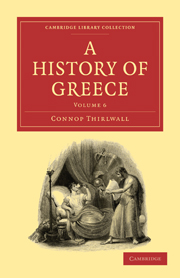Book contents
- Frontmatter
- Contents
- CHAPTER XLV FROM THE END OF THE SACRED WAK TO THE RENEWAL OF HOSTILITIES BETWEEN PHILIP AND THE ATHENIANS
- CHAPTER XLVI FROM THE RENEWAL OF HOSTILITIES BETWEEN PHILIP AND THE ATHENIANS TO HIS DEATH
- CHAPTER XLVII FROM ALEXANDER'S ACCESSION TO THE TAKING OF THEBES
- CHAPTER XLVIII RETROSPECTIVE SURVEY OF THE HISTORY OF PERSIA FROM THE PEACE OF ANTALCIDAS TO ALEXANDER'S ACCESSION
- CHAPTER XLIX ALEXANDER'S EXPEDITION IN ASIA TO THE BATTLE OF ISSUS
- CHAPTER L FROM THE BATTLE OF ISSUS TO THE TAKING OF PERSEPOLIS
- CHAPTER LI FROM THE TAKING OF PERSEPOLIS TO THE DEATH OF DARIUS
- CHAPTER LII ALEXANDER'S CAMPAIGNS IN BACTRIA AND SOGDIANA
- APPENDIX: On some Points in the Geography of Alexander's Marches
CHAPTER XLV - FROM THE END OF THE SACRED WAK TO THE RENEWAL OF HOSTILITIES BETWEEN PHILIP AND THE ATHENIANS
Published online by Cambridge University Press: 05 July 2011
- Frontmatter
- Contents
- CHAPTER XLV FROM THE END OF THE SACRED WAK TO THE RENEWAL OF HOSTILITIES BETWEEN PHILIP AND THE ATHENIANS
- CHAPTER XLVI FROM THE RENEWAL OF HOSTILITIES BETWEEN PHILIP AND THE ATHENIANS TO HIS DEATH
- CHAPTER XLVII FROM ALEXANDER'S ACCESSION TO THE TAKING OF THEBES
- CHAPTER XLVIII RETROSPECTIVE SURVEY OF THE HISTORY OF PERSIA FROM THE PEACE OF ANTALCIDAS TO ALEXANDER'S ACCESSION
- CHAPTER XLIX ALEXANDER'S EXPEDITION IN ASIA TO THE BATTLE OF ISSUS
- CHAPTER L FROM THE BATTLE OF ISSUS TO THE TAKING OF PERSEPOLIS
- CHAPTER LI FROM THE TAKING OF PERSEPOLIS TO THE DEATH OF DARIUS
- CHAPTER LII ALEXANDER'S CAMPAIGNS IN BACTRIA AND SOGDIANA
- APPENDIX: On some Points in the Geography of Alexander's Marches
Summary
The state of public feeling in Athens at the close of the Phocian war, may be easily conceived. It was a struggle between fear and resentment. Fear of an enemy who had been irritated by a long conflict, had become more powerful than ever, and, while his forces had been brought nearer to the confines of Attica than they had ever before advanced, had given a fresh specimen, in the political extinction of another Grecian state, of the fearful lengths to which his animosity might be carried, or to which he might even be led by the cool calculations of his ambitious policy. Resentment, which was so much the keener, because the injury that provoked it was one which afforded but slight ground for remonstrance, or even for complaint. One of the consequences of this state of feeling was, that the peace just concluded, though almost universally admitted to be necessary, became generally odious, and its authors and promoters–the orators who proposed and recommended it, and the negotiators who brought it about–extremely unpopular. Demosthenes, as one of the ambassadors who had been engaged in this business, must have shared the odium to which his colleagues were exposed, if he had not been able to separate his case from theirs, and if the whole tenor of his past public life had not exempted him from all suspicions of a leaning toward the Macedonian interest.
- Type
- Chapter
- Information
- A History of Greece , pp. 1 - 51Publisher: Cambridge University PressPrint publication year: 2010

